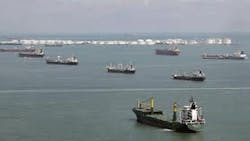SEOUL -- China, Japan and South Korea kicked off formal negotiations Tuesday on securing a free trade agreement to bind together three economies that account for around 20% of global gross domestic product.
With all three countries under new leadership, trade officials hope they can move beyond damaging territorial disputes that have dogged their relations for decades.
The idea of a trilateral FTA has been on the table for decades, but diplomats say China is now pushing especially hard for a pact, in part as a counter to U.S. initiatives in Asia.
Washington is leading negotiations on a Trans-Pacific Partnership (TPP) free trade pact that some see as part of the so-called U.S. "pivot" -- aimed at reaffirming the U.S. role in Asia in the face of China's economic rise.
The TPP talks currently involve Australia, Brunei, Canada, Chile, Malaysia, Mexico, New Zealand, Peru, Singapore, the United States and Vietnam.
While China is conspicuously absent, new Japanese Prime Minister Shinzo Abe announced earlier this month Japan's decision to participate in the negotiations.
The initial round of trilateral FTA talks is being held in Seoul, after which the negotiations will move to China followed by a third round in Japan, trade officials from South Korea said.
China, Japan and South Korea are now Asia's largest, second-largest and fourth-largest economies, while trade volume between them amounted to $690 billion in 2011.
Among other issues, the discussions are expected to hit opposition from Japanese and South Korean farmers worried about an inflow of cheaper agricultural products such as Chinese rice.
"Farmers are already suffering more difficulties due to Seoul's free trade pacts with the European Union and the United States," the Korean Advanced Farmers Federation said.
The federation threatened to launch an anti-government campaign if South Korea pursues the FTA with China and Japan.
But the main hurdle lies in the form of bitter, long-standing territorial disputes that have raised diplomatic and military tensions and hampered economic cooperation.
China and Japan are arguing about sovereignty over an archipelago in the East China Sea, while Japan and South Korea have a historic dispute over ownership of islands in waters between the two countries.
The first round of talks between deputy trade ministers in Seoul will last three days and "will involve no practical negotiations", a South Korean official said.
“It will cover broad matters such as the scope, agenda and procedure for further negotiations," the official said.
Copyright Agence France-Presse, 2013
About the Author
Agence France-Presse
Copyright Agence France-Presse, 2002-2025. AFP text, photos, graphics and logos shall not be reproduced, published, broadcast, rewritten for broadcast or publication or redistributed directly or indirectly in any medium. AFP shall not be held liable for any delays, inaccuracies, errors or omissions in any AFP content, or for any actions taken in consequence.
